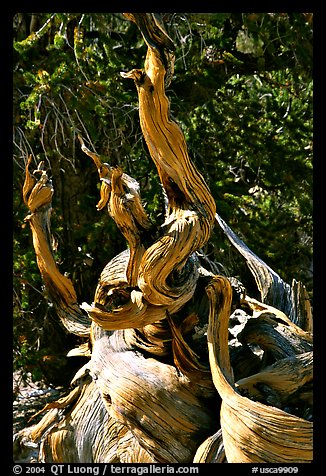| View previous topic :: View next topic |
| Author |
Message |
Junior

Joined: 18 Nov 2005
Location: the eye
|
 Posted: Sun Aug 06, 2006 10:02 pm Post subject: random amazing fact of the day: did u know that______?? Posted: Sun Aug 06, 2006 10:02 pm Post subject: random amazing fact of the day: did u know that______?? |
 |
|
just to keep your sense of awe and wonder alive..post us some trivia you find interesting. Something not many people know..I'll start.
Did you know that...
Methuselah is a bristlecone pine in the White Mountains of California, which, at 4789 years old, is the oldest living organism currently known and documented. It is named after Methuselah, a biblical figure reputed to have lived 969 years. Its exact location is currently undisclosed to the public as a protection against vandalism.

An older specimen, nicknamed Prometheus, was at least 5000 years old however it was cut down in 1964.
http://en.wikipedia.org/wiki/Methuselah_%28tree%29
INCREDIBLE!!!! That tree must have seen a lot of things in its time... |
|
| Back to top |
|
 |
Clutch Cargo

Joined: 28 Feb 2003
Location: Sim City 2005
|
|
| Back to top |
|
 |
Bulsajo

Joined: 16 Jan 2003
|
|
| Back to top |
|
 |
mindmetoo
Joined: 02 Feb 2004
|
|
| Back to top |
|
 |
wormholes101

Joined: 11 Mar 2003
|
|
| Back to top |
|
 |
HapKi

Joined: 10 Dec 2004
Location: TALL BUILDING-SEOUL
|
 Posted: Mon Aug 07, 2006 1:36 am Post subject: Posted: Mon Aug 07, 2006 1:36 am Post subject: |
 |
|
Did you know that the Korean word 강 means river?
And the Korean word 간 means liver?
Mind-blowing, isn't it? |
|
| Back to top |
|
 |
wormholes101

Joined: 11 Mar 2003
|
 Posted: Mon Aug 07, 2006 8:05 pm Post subject: Posted: Mon Aug 07, 2006 8:05 pm Post subject: |
 |
|
Random fact of the day: Did you know that the current official world record for breath holding is 8:58? Eight minutes, fifty-eight seconds!

The event is also know as "static apnea". The world record holder is Tom Siestas, a German. He also holds the world record for the longest swim underwater without fins (180m) and the longest underwater swim with fins (212m).
http://apneamania.com/code/divers_sel.asp?diverID=134 |
|
| Back to top |
|
 |
matthews_world
Joined: 15 Feb 2003
|
 Posted: Mon Aug 07, 2006 9:47 pm Post subject: Posted: Mon Aug 07, 2006 9:47 pm Post subject: |
 |
|
I know there are some newbies here so I thought that I would dispell them myth.
Ramyun indeed come from China!

| Quote: |
Ramen is a newcomer in Japanese cuisine originating from China. While Tokugawa Mitsukuni reportedly ate ramen in the late 17th century, it was only during the Meiji period that ramen became widely known�perhaps because, for most of its history, the Japanese diet consisted mostly of vegetables and seafood rather than meat. The introduction of American and European cuisine, which demanded increased production of meat products, played a large role in ramen becoming popular.
Though of Chinese origin, it is unclear when, from where and by whom ramen was introduced to Japan. Even the etymology of the term "ramen" is a topic of debate. One hypothesis is that "ramen" is the Japanese pronunciation of 拉麺 (lamian), meaning "hand-pulled noodles." A second hypothesis proposes 老麺 ("laomian", "old noodles") as the original form, while yet another states that ramen was initially 鹵麺 (lumian), noodles cooked in a thick, starchy sauce. Finally, others peg 撈麵 (Cantonese: Lo mein, Mandarin: lāo mi�n), meaning "stirred noodles," as the origin of "ramen."
(There are also anecdotal origins: one story purports that the name was originally 柳麺 (liumian), meaning "Liu's noodle," with Liu being the cook who ostensibly popularized the dish.)
In the early Meiji period, ramen was called shina soba (支那そば, literally "Chinese soba") but today chūka soba (中華そば, also meaning "Chinese soba") is the more politically correct alternative. By 1900, restaurants serving Chinese cuisine from Canton and Shanghai sold a simple ramen dish of noodles (cut rather than hand pulled), a few toppings, and a broth flavored with salt and pork bones. Many Chinese also pulled portable food stalls and sold ramen and gyōza dumplings to workers. By the mid 1900s, these stalls were using a type of a musical horn called a charumera (チャルメラ, from the Portuguese charamela) to advertise their presence, a practice some vendors still retain via a loudspeaker and a looped recording. By the early Shōwa period, ramen had become a popular dish when eating out. |
http://en.wikipedia.org/wiki/Ramen#History |
|
| Back to top |
|
 |
|

